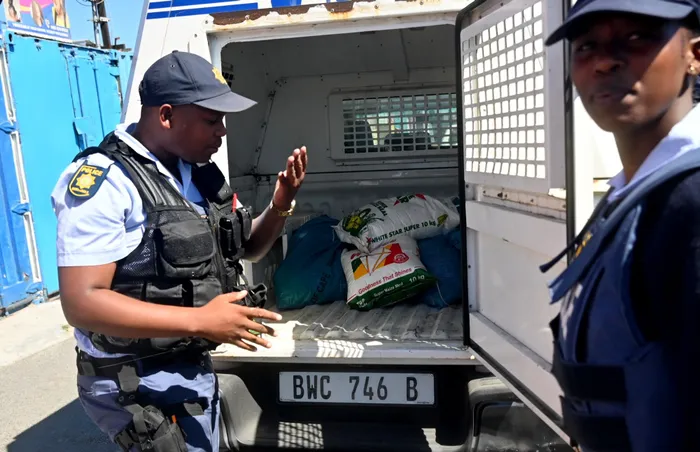Anger over dumped expired food

Police officers took away the expired food found dumped in Town Two.
Tensions are high in Khayelitsha after what is suspected to be expired spaza shop stock was found dumped.
The discovery follows a nationwide crackdown on spaza shops in response to food-poisoning incidents that have claimed the lives of several children across the country.
Packs of sealed sweets that expired in 2021 along with biscuits that expired in 2022 and maize meal that expired in February this year were found in municipal garbage bags inside a shipping container used for dumping in Town Two on Tuesday.
Cleaners told Vukani they had found children scavenging through expired products and chased them away.
As more residents and community leaders gathered, tempers flared and some called for nearby shops owned by foreign nationals to be closed immediately while others said they were worried about their children's health.
Police spokesperson FC Van Wyk said members of Makhaza SAPS and the Crime Prevention Unit had responded to information received of spaza shop owners dumping alleged expired stock in a dumping container.
“Councillors and the community were concerned as children allegedly attempted to take the discarded food items. The members collected the discarded food items for safety reasons and (it) was booked in at Makhaza SAPS as abandoned.”
The incident happened in the Lingelethu West police precinct, and that station’s spokesperson, Sergeant Xoliswa Nyalambisa, said an inquiry had been opened at the station, but no one had been arrested.
The incident comes days after President Cyril Ramaphosa addressed the nation about a surge in incidents in which children have died as a result of food contamination. The president confirmed that pesticide-related deaths had claimed the lives of more than 20 children across the country.
In his speech, the president said that since the beginning of September there had been 890 reported cases of food-borne illness across the country with Gauteng and KwaZulu-Natal being the worst affected followed by Limpopo and Mpumalanga.
The president said the priority was to get hazardous pesticides off the shelves and streets and that all spaza shops should be registered with their local municipality within 21 days. Any shop not registered and not meeting the required health standards would be closed.
Teams made of military personnel, environmental health practitioners, police and representatives from consumer and labour bodies, would be going door to door to inspect spaza shops, starting in Gauteng and Kwa-Zulu-Natal, he said.
Ward councillor Ryder Mkutswana said that after being alerted to the dumping, he had rushed to the scene and alerted the police so that the products could be removed.
He said he was worried about children who might consume the expired products.
“We are deeply saddened and shocked about this matter. We want police officers to firstly conduct an operation to check their documents and arrest those who are found to be here illegally," he said, referring to foreign nationals who own spaza shops.
“We will then have a big operation where all various stakeholders will join and inspect the products that they are selling to us.
“We are in great danger if we do not stand up as the community at large to ensure that we are sold the right and quality products,” he said.
Another ward councillor, Thando Pimpi, said he believed the products had been dumped in response to the president's speech. He called for all the shops alongside Japhta K Masemola Road next to the container to be closed.
A neighbourhood watch chairperson, Andiswa Ntsangani, said they were extremely concerned about what they had seen, and they felt unsafe.
Ms Ntsangani said they planned to be part of a meeting with the police and others in the community and would call for spaza shops to be searched and their products checked.
Mayoral committee member for community services and health Patricia van der Ross said that “shelf stable” foods, that is non-perishable foods that can be stored at room temperature, could still be safe to use after their sell-by date although their nutritional value might diminish. However, perishables and cold-chain goods should not be sold past the use-by dates.
Environmental health practitioners who came across foodstuffs that they believed posed a health risk if consumed were legally obligated to seize them, but that happened rarely, she said. - Additional reporting by the Cape Times


...